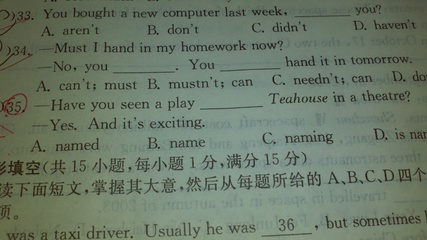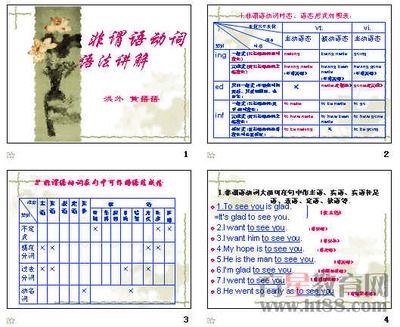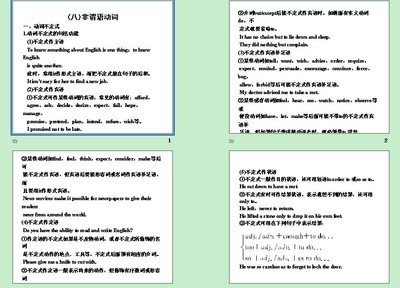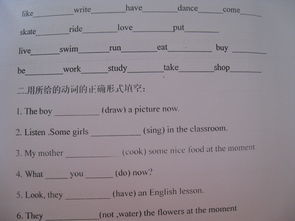非谓语动词
顾名思义,非谓语动词就是不能作谓语的动词。包括:不定式、现在分词、过去分词和动名词。
不定式
1.不定式的构成
不定式是由不定式符号to+动词原形构成,在某些情况下to也可省略。不定式一般有时态和语态的变化,通常有下表中的几种形式(以do为例):
主动式 | 被动式 | |
一般式 | to do | to be done |
完成式 | to have done | to have been done |
进行式 | to be doing | / |
完成进行式 | to have been doing | / |
2.不定式的语法作用
1)不定式作主语:
To see once is better than to hear a hundredtimes. 百闻不如一见。
To master a foreign language is not an easy thing.掌握一门外语不是一件容易的事。
在很多情况下,人们通常用it作为形式上的主语,而把不定式短语移到谓语之后,使句子显得平稳一些。如:
It’s good manners to wait inline.排队等候是很有礼貌的。
It made us very angry to hear him speak to his mother likethat.
听到他那样跟他妈妈说话我们很生气。
2)不定式作表语:
The most important thing is to put theory intopractice.最重要的事情是把理论付诸实践。
The greatest happiness is to work for the happiness ofall.
最大的幸福就是为大家的幸福而工作。
3)不定式作宾语:
He wanted to know the truth.他想知道真相。
I prefer to be starved to death rather thanbeg.我宁愿被饿死也不愿乞讨。
He pretended to have read the book when I asked him aboutit.
我问到他的时候,他假装读过这本书。
另外,不定式在某些复合宾语中作宾语时,人们常常用it代表不定式,而将真实宾语放在补足语之后。如:
Do you think it better to translate it in thisway?你认为这样翻译是不是更好?
I feel it a great honor to be invited to speak at the meetingbefore so many students.
我觉得被邀请在会上面对这么多学生发言是一件很光荣的事情。
4)不定式作补语:
①不定式可以和名词或代词一起构成复合结构作动词的宾语,这时不定式被称为宾语补足语。如:
I would like you to help me with my Englishexercises.我想请你帮我做英语练习。
I never expected the shoes to be worn out sosoon.我从来没想到鞋子这么快就穿破了。
注意:动词help后面接不定式作宾语或宾语补足语可以带to也可以不带to。如:
Who can help me (to) carry this heavybox?谁能帮我拎这个重箱子?
②在make, let, have等使役动词和hear, see, watch,notice, feel,observe等感官动词后的复合宾语中,动词不定式不带to。
I often hear her sing in the nextroom.我经常听到她在隔壁唱歌。
They make the baby go to bed at 7:00 p.m.everyday.
他们每天让孩子晚上7:00上床睡觉。
注意:get,leave等词也有“让”“叫”的意思,和使役动词意思相近,但它们后面的不定式作宾语补足语必须要有to。如:
I’ll get him to try itagain.我将让他再试一次。
How could you leave him to have supper with a stranger?
你怎么让他跟一个陌生人一起吃晚饭?
注意:当使役动词和感官动词变为被动语态时,不定式就成了主语补语,作主语补语的不定式必须加to。如:
Though he had often made his little sister cry, today he wasmade to cry by his littlesister.
尽管他经常弄哭他的小妹妹,但今天他却被他的小妹妹弄哭了。
He is often heard to sing thesong. 经常有人听到他唱这首歌。
⑤不定式作定语时,有时与被修饰的名词之间有意义上的动宾关系,如果该不定式动词是不及物动词,它后面需加上适当的介词。如:
There is nothing to worryabout.没什么可担心的。
There are many interesting books to choose from, but I don’tknow which to borrow.
有很多有趣的书可以挑选,但我不知道该借哪一本。
6) 不定式作状语:
不定式作状语可以表示行为的目的、结果、原因、条件等。
① 不定式作目的状语,有时也可以用in order (not) to, so as (not) to结构。如:
In order to protect the young plants from the sun, Mother put themin the shade.
为了保护幼苗不被太阳晒坏,妈妈把它们放到了阴凉处。
He got up very early this morning so as not to be late forschool again.
今天早上他起身很早以免上学再迟到。
注意:so as (not) to do不可以置于句首。
②不定式作结果状语,常见的结构有too…to, enough…to, so…as to, such…as to, onlyto…等。如:
The question is too difficult for me toanswer. 对我来说,这个问题很难回答。
He said he was clever enough to deal with it by himself.
他说他足够聪明可以独自应付这件事。
Will you be so kind as to turn down the radio?请你帮我把收音机调低一点好吗?
He woke up only to find himself in hospital. 他醒来发现自己在医院里。
注意:too…to通常表示太……而不……,但在下列句子中没有否定的意思。
She is only too glad to stay athome.她太想留在家里了。
He is too anxious to know the examination results.他很急切地想知道考试结果。
另外还有ready(现成的,乐意的), eager(迫切的),inclined(偏于…的),apt(易于)。
③不定式作原因状语,通常用来修饰表示情感、心理状态、性格等的形容词。常见的形容词有:happy, glad, lucky,fortunate, surprised, angry, anxious, ready, quick, slow, cruel,clever, frightened, shocked, sorry, eager, proud, disappointed,foolish, impatient, unwise, naughty等。如:
They are surprised to learn of hisdeath. 得知他死亡的消息,他们很惊讶。
We are proud to be young people of new China.成为新中国的青年,我们感到很骄傲。
另外,hard, difficult, easy,fit,comfortable等词也可以接动词不定式。这时候,作句子主语的除了是表示人的词外,还可以是表示物的词。如:
The water is not fit todrink. 这水不适合饮用。
The room is very comfortable to livein. 这个房间住起来很舒服。
注意:后两句中的不定式与句子的主语或宾语之间是动宾关系,此时如果不定式动词是不及物动词,则需要带上适当的介词。
2.for somebody to do和of somebody to do的用法区别:
句型“It is +形容词+for somebody+不定式”中的形容词通常强调不定式的行为属性,如:important,possible, impossible, necessary, difficult, hard, reasonable等。
It’s difficult for us to finish the work within twohours.我们要在两小时之内完成工作是很难的。
It’s reasonable for them to run away soquickly.他们这么快就逃跑了是很有道理的。
“It is +形容词+of somebody+不定式”中的形容词表示人物性格和特征。如:kind, silly, good,unwise, clever, wrong, right, foolish, stupid, careless, rude,impolite, bold, thoughtful, honest, bad, sensible, naughty等。
It’s kind of you to think so much of us.难为你这么为我们着想。
It’s silly of the boy to keep pouring water into the basket这个男孩真傻,一直往篮子里倒水。
选择填空:
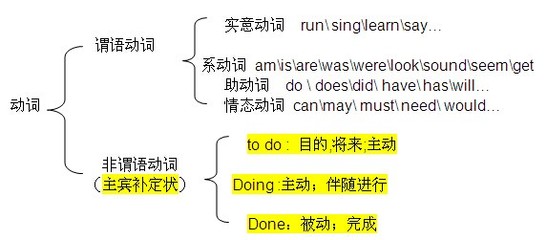
1. I’ve heard him ______about you often.
A.speakB.speaksC.spokeD. speaking
2. I went to see him,_______him out.
A. findingB.findC. only tofindD. to finding
3. Hedidn’t know_______or stay.
A. toleaveB. if that he shouldleaveC. if toleaveD.whether to leave
4. ---Willthe Smiths go abroad thissummer?---No, they finally decided_______.
A.toB. not goingC. not toD. not to be going
5. ---I usually go there by train. ---Why not_______by boat for a change.
A. to trygoingB. trying to goC. to try andgoD. try going
6. Hepretended_______nothingabout it.
A.knowB. toknowC.knowingD. knew
7. LittleJim should love _______to the theatre this evening.
A. to betakenB. totakeC. beingtakenD. taking
8.They would not allow him _______across the enemy line.
A. to riskgoingB. risking to going C. for risk togoD. risk going
9. There are so many kinds of tape-recorders on sale that Ican’t make up my mind _______to buy.
A.whatB.whichC.howD. where
10. Charles Babbage isgenerally considered _______the first computer.
A. toinventB.inventingC. to have invented D. having invented
11. The missing boys werelast seen _______near the river.
A.playingB. to beplayingC.playD. to play
12. The patient was warned_______oily food after the operation.
A. to eatnotB. eatingnotC. not toeatD. not eating
13. I regret_______ youthat we are unable to offer you employment.
A.informingB. having informed C. toinformD. to informing
14. You had better get adoctor _______your bad tooth.
A. pulloutB. to pulloutC. pulledoutD. pulling out
15. The matter had better_______ as itis.
A.leaveB. beingleftC.leavingD. be left
16. He was so foolish_______ his car unlocked.
A. toleaveB. thatleaveC. as toleaveD. for him to leave
17. Almost everyone fails_______the driving test on the first try.
A.passingB. to have passed C. topassD. in passing
18. Thegirl was made _______she didn’tlove at all.
A. marry a manB. to marry amanC. to marry with amanD. married with a man
19. The man will use what he has_______a camera for his wife.
A. togetB.gotC.buyD bought
20. .To answer correctly is more important than_______.
A. a quickfinishB. to finishquicklyC. finishingquicklyD. you finish quick
21. Tom kept quiet about theaccident_______lose his job.
A. so as nottoB. so not as toC. so as tonotD. not so as to
22. I felt it an honor_______ tospeak here.
A. toaskB.askingC. to beaskedD. having asked
23. ---I’d like to buy anexpensive camera.
---Well, we have several models_______ .
A. to choose from B. tochooseC. to bechosenD. for choice
24._______tothe left and you’ll see the post office.
A. ToturnB. TurningC.TurnedD. Turn
25. Will you be able to attendthe lecturenext week?
A.givingB.givenC. to begivenD. being given
Ⅱ. 句子改错:
1. I don’t know if to help him or not.
2. She can’t help cleaning the house because she’s busy making acake.
3. We all hope you to make rapid progress.
4. The results of the research are to publishsoon.
5. It is too heavy for me to lift it.
6. It’s awfully good for you to come and meetus.
7. These are very good books for your childrento be read.
8. He did what he could help me with myphysics.
9. Let’s find a place to put the things.
10. It would be easier to climb over the mountain than goinground the valley.
I.选择填空:
1---5ACDCD6---10 BAABC
11---15 ACCBD16---20 CCBAB
21---25ACADC
II.句子改错:
1.if→whether2.cleaning →toclean3. hope →wish4.publish →be published
5.liftit →lift6.for →of7. be read→read8.help →to help9.things →things in10.going →to go
-ing分词
1. -ing分词的构成
-ing分词是由动词原形加词尾-ing构成。-ing分词同样有时态和语态的变化,通常有下表几种形式(以do为例):
主动形式 | 被动形式 | |
一般式 | doing | being done |
完成式 | having done | having been done |
-ing分词的否定形式是由not 加-ing分词构成。如:
Not knowing his address, I could do nothing but stay at home andwait.
不知道他的地址,我只好在家里等着。
His not coming made all of usangry. 他没来使我们大家都很生气。
2. -ing分词的一般式和完成式:
-ing分词的一般式表示和谓语动词所表示的动作同时进行的动作;完成式表示在谓语动词所表示的动作之前发生的动作。如:
Being a student, he was interested inbooks. 作为一个学生,他对书本很感兴趣。
Not having studied his lessons very hard, he failed theexaminations. 因为没有努力学习功课,他考试不及格。
3. -ing分词的被动式:
-ing分词的被动式表示它的逻辑主语是-ing分词动作的承受者。根据-ing分词动作发生的时间,-ing分词的被动式有一般被动式(beingdone)和完成被动式(having been done)。如:
The question being discussed is veryimportant.正在被讨论的问题很重要。
He never talked about his having been interviewed by thereporter.他从来没谈起过他被记者采访的事情。
Having been criticized by the teacher, he gave up smoking.被老师批评以后,他把烟戒了。
注意:在need,want, require, be worth等动词(短语)后,作宾语的-ing分词常用主动形式来表示被动含义。如:
Your shoes need cleaning. = Your shoes need tobe cleaned. 你的鞋需要清洗一下了。
This book is well worthreading. 这本书很值得一看。
4. -ing分词的语法作用
-ing分词一方面具有动词的性质,另一方面也相当于一个名词或形容词、副词,在句中可以作主语、表语、宾语、定语、状语和补语等。
1)–ing分词(短语)作主语:
Laying eggs is the ant queen's full-timejob. 产卵是蚁后的专职工作。
Saying is easier than doing.说比做容易。
在下面两种结构中,-ing分词也作主语。
①为了保持句子平衡,通常用作形式主语,而把真实主语放在句末。如:
It is no use crying over spiltmilk. 作无益的后悔是没有用的。
It's a waste of time arguing aboutit. 辩论这事是浪费时间。
②在There is no结构中,通常用-ing分词。如:
There is no joking about suchmatters. 这种事开不得玩笑。
There is no holding back the wheel ofhistory. 历史车轮不可阻挡。
2)-ing分词(短语)作表语:
His hobby is collectingstamps. 他的爱好是收集邮票。
The problem is quitepuzzling. 这个问题很令人困惑。
3)-ing分词作宾语:
①–ing分词作动词宾语。如:I suggest doing it in a differentway. 我建议用另一种方法做这件事。
We enjoy attending Miss Li'sclass. 我们喜欢听李老师的课。
②-ing分词作宾语也可用在复合宾语中作真正的宾语,而用it作形式宾语。如:
I don’t think it possible living in such a coldplace.我认为住在这么寒冷的地方是不可能的。
Do you consider it any good tryingagain? 你觉得再试一次会有好处吗?
③-ing分词作介词宾语,经常用在一些短语的后面。如:
I'm against inviting him todinner. 我反对邀请他来吃饭。
They don’t feel like walking thatmuch. 他们不喜欢走那么多路。
He went to London in the hope of being a famouspainter.他去了伦敦,希望能成为一个著名的画家。
此类短语还有很多。如:look forward to(渴望,盼望), be proud of(以……自豪), beresponsible for(对……负责), insist on(坚持), think of(考虑,想到), dreamof(梦想), object to(反对,抗议), hear of(听说), prevent…from(防止,阻止),keep…from(防止,阻止), stop…from(防止,阻止), be engaged in(从事于), dependon(依靠,依赖), thank…for(因……而道谢), excuse…for(因……而道歉), aim at(目的在于),devote…to(献身于), set about(着手做), be/get used to(习惯于), be fondof(喜欢), be afraid of(害怕), be tired of(对……厌烦), succeed in(成功地做……),be interested in(对……感兴趣), be ashamed of(对……感到羞愧)等等。
注意:在有些句子中,介词常可省去。如:
I have no difficulty (in) communicating withforeigners.我在和外国人交谈方面没有什么困难。
He used to spend a lot of time (in) playinggames. 过去他常花很多时间玩游戏。
What can prevent us (from) gettingmarried? 有什么能阻止我们结婚?
另外,-ing分词可以和一些介词如in, on, after, against, before, by, for, without,besides等构成短语,在句中作状语。如:
He left ahead of time without saying aword.他一句话也没说就提前离开了。
Besides cooking and sewing, she had to take care of fourchildren.
除了做饭和缝纫以外,她还要照顾四个孩子。
On hearing the news, all the pupils jumped withjoy.听到这个消息后,所有的学生都高兴得跳了起来。
4)-ing分词作定语:
①单个的分词作定语一般放在被修饰词的前面。如:
reading room阅览室 swimmingpool游泳池dining car 餐车
sleeping car卧车 singing competition歌咏比赛 waitingroom 候车室
a waiting car 一辆等待着的车 asleepingchild一个酣睡的孩子flying fish 飞鱼
the excitingnews令人振奋的消息a boring speech令人乏味的演出
②-ing分词短语作定语应放在被修饰词的后面,也相当于一个定语从句。如:
Who is the comrade standing by thedoor? 站在门边的同志是谁?
They lived in a house facingsouth. 他们住在一所朝南的房子里。
③–ing分词还可以作非限制性定语,相当于一个非限制性定语从句,常用逗号和句子其它部分分开。如:
The words, usually dealing with current work, were mostlywritten by himself.
歌词一般讲当前的工作,大部分是他自己写的。
When she appeared, John, wearing a dirty and worn-out overcoat,ran to her withjoy.当她出现的时候,约翰穿着一件又脏又破的大衣高兴地跑了过去。
5)-ing分词做状语:
-ing分词作状语可以表示时间、原因、结果、条件、让步、方式或伴随情况等。
①-ing分词短语作时间状语,相当于一个时间状语从句,有时可由连词when, while引出。如:
While reading the book, he nodded from time totime.他一边看书,一边不时地点头。
Seeing those pictures, she remembered herchildhood.看到那些画,他想起了她的童年。
②-ing分词短语作原因状语,相当于一个原因状语从句。如:
Not knowing his address, I can’t send this book tohim.因为不知道他的地址,我不能把这本书送给他。
Many of us, being so excited, couldn’t go to sleep thatnight.因为非常激动,那晚我们许多人都没睡着。
③–ing分词短语作结果状语。如:
His father died, leaving him a lot ofmoney. 他父亲死了,留给他许多钱。
She was so angry that she threw the toy on the ground, breakingit into pieces.
她非常生气,把玩具扔在地上,把它摔成了碎片。
④-ing分词作伴随状语,可以放在句子的前面、后面或中间,表示主语的另一个、较次要的动作。如:
They stood there for half an hour watching the stars in thesky.他们在那儿站了半小时,观察着天上的星星。
Following the old man, the young people started walkingslowly.
年轻人跟在老人的后面开始慢慢地走起来。
⑤-ing分词间或也可作条件状语和让步状语,相当于一个状语从句。如:
A person standing at the foot of a high mountain will findhimself very small.
一个人如站在大山的脚下会发现自己很渺小。
Knowing all this, they made me pay for thedamage.尽管知道了一切情况,他们还是要我赔偿损失。
注:-ing分词作状语时,它的逻辑主语就是整个句子的主语。
⑥“with/without+名词普通格或代词宾格+-ing分词”结构在句中作状语,表示伴随情况或时间、原因等。如:
His hair became grey with the yearspassing. 随着时间的推移,他的头发变花白了。
Without anyone noticing, he slipped through thewindow.没人注意,他从窗户溜了出去。
6)-ing分词作补语:
①--ing分词可以在see, hear, notice, watch, feel, look at, listen to,observe, have, get, leave, keep, set, catch,find等动词后面和一个名词或代词构成一个复合宾语,作宾语补语。如:
I noticed a man running out of the bank when I got off thecar.
我下车的时候注意到一个男人匆匆忙忙地从银行里跑出来。
Last night the shopkeeper caught a child stealing some food inthe shop.
昨晚,店主在商店里抓到一个小孩在偷东西。
②上面这类句子也可变成被动语态,这时,-ing分词可看成是主语补语。如:
We were kept waiting for quite a longtime. 让我们等了好长时间。
Jily was never heard singing that song again.人们再也没有听到吉丽唱这首歌了。
4. -ing分词作表语的两种不同含义:
①-ing分词作表语可以表示主语的内容是什么。如:
Their job is building houses. 他们的工作是盖房子。
The real question is getting to know the needs of thepeople.真正的问题是了解人民的需要。
②-ing分词作表语还可以表示主语所具有的特征。如:
This story is veryinteresting. 这故事很有趣。
The problem is quitepuzzling. 这个问题很令人困惑。
5. -ing分词作定语的两种不同含义:
①–ing分词作定语可用来说明被修饰的名词的用途和性能。如:
reading material阅读材料walking stick手杖fishing pole 鱼杆
flying suit飞行服 writingtable写字台listening practice 听力训练
②-ing分词作定语还可以表示所修饰的人或物的动作或状态,在意思上接近一个定语从句,可以表示正在进行的动作,也可表示经常性动作或当时的状态。如:
developing countries = countries that aredeveloping 发展中国家
a growing city = a city that isgrowing 发展着的城市
an ordinary-looking house = a house that looksordinary 看起来很普通的房子
a touching story = a story that istouching 一个动人的故事
working people= people who areworking 劳动人民
6. 不定式和-ing分词作宾语补语的区别:
在see,hear, feel, watch,notice等感官动词后,既可用-ing分词构成复合宾语,也可用不定式构成复合宾语,两者之间有一定的区别。用-ing分词时,表示动作正在进行;用不定式时,表示动作发生了,即动作的全过程结束了。如:
Do you hear someone knocking at the door?(Someone is knocking at thedoor.)有人在敲门你听见了吗?
Do you hear someone knock at the door?(Someone knocked at the door just now.)你听见有人敲门了吗?
选择填空:
1. The officers narrowly escaped___________in the hotbattle.
A. havekilledB. tokillC. to bekilledD. being killed
2.___________the letter, he went out to post it.
A.WritingB. BeingwritingC. HavingwrittenD. Written
3. Don't you remember___________?
A. seeing the manbeforeB. to see the man before
C. saw the manbeforeD. to have seen the man before
4. People couldn't help___________the foolish emperor in the procession.
A. laughatB. to laughatC. laughingatD. laughing on
5. We’re looking forward___________the photoexhibition.
A. to visitingB. tovisitC. to having visitedD. visiting
6. The girl___________under thattree is my sister.
A.sittingB.sitsC. issittingD. sat
7. This sentence needs___________.
A. aimprovementB.improveC.improvingD. improved
8.___________anything about the accident, he went to work asusual..
A. NotknownB. KnownnotC. KnowingnotD. Not knowing
9. The next morning she found the man___________in bed, dead.
A.lyingB.lieC.layD. laying
10. There was terrible noise___________the sudden burst of light.
A.followedB.followingC. to befollowedD. being followed
11. The secretary worked late into the night,___________a long speech for the president.
A. toprepareB.preparingC.preparedD. was preparing
12. “Can't you read?” Mary said___________tothe notice.
A. angrilypointingB. and point angrily C.angrilypointedD. and angrily pointing
13. How about two of us___________a walk down the garden?
A. totakeB.takeC.takingD. to be taking
14. ---I must apologize for___________aheadof time.---That’s all right.
A. letting you notknowB. not letting you know
C. letting you knownotD. letting not you know
15. ---You were brave enough to raise objections at themeeting. ---Well, now I regret___________that.
A. todoB. to be doingC. to havedoneD. having done
16. Would you___________me your identification card, sir?
A. mind toshowB. mindshowing C.trouble to showD. trouble showing
17. He suggested___________onSaturday.
A. to have ameetingB. having ameeting C. ameeting tohaveD. that having a meeting
18. It is no good___________to come now. He is busy.
A. if you askhimB. to ask himC. askinghimD. that you ask him
19. Although punctual himself, the professor was quite used___________late for his lecture.
A. to havestudentsB. for students to be
C. for students’beingD. to students’ being
20. He dressed himself quickly and___________his schoolbag, went to school.
A.carriedB. tocarryC.carryingD. carries
21. ___________ for severalweeks, the city needed food.
A. As havingfloodedB. beingfloodedC. Having beenfloodedD. To flood
22.___________ ill worried myparents greatly.
A. IfellB. Me fallingC. MyfallingD. I falling
23. She is writing a letter to a friend of hers,___________him to attend the meeting.
A. havinginvitedB.invitingC. toinviteD. invited
24. Our town has dozens of factories,___________severalsaw mills.
A.includedB. areincludingC. areincludedD. including
25. ___________the classroom, the students went to theplayground to watch the football match.
A. TocleanB. Having cleaned C.CleanedD. Cleaning
1—5D C ACD6---10 AC D A B
11---15B A CBD16---20 BB C DC21---25 C CB D B
过去分词
1. 过去分词的定义
动词的-ed分词即过去分词,是由动词的过去分词构成,一般只有一种形式。
2. 过去分词的语法作用:
过去分词一方面具有动词的性质,另一方面也相当于一个形容词或副词,在句中可以作表语、定语、状语和补足语。
1) 过去分词作表语,主要表示主语的心理感觉或所处的状态。如:
Don’t touch the glass because it isbroken. 不要碰那个杯子,它是坏的。
He is quite pleased with the design of thedress. 她很喜欢那礼服的式样。
2) 过去分词做定语:
单个的过去分词作定语一般放在名词的前面,相当于一个定语从句。如:
The excited people rushed into thebuilding. 激动的人们奔进了大楼。
We need more qualifiedteachers. 我们需要更多合格的教师。
过去分词短语作定语通常放在被修饰的词后面,相当于一个定语从句。如:
Is there anything planned fortomorrow? 明天有什么活动吗?
The suggestion made by the foreign expert was adopted by themanager.外国专家提出来的建议被经理采纳了。
过去分词作定语也可用作非限制性定语,前后用逗号隔开。如:
The books, written by Lu Xun, are popular with many Chinesepeople.这些书是鲁迅写的,受到了许多中国人民的喜爱。
The meeting, attended by one thousand students, was asuccess. 这次会议获得很大的成功,共有一千个学生出席了。
3) 过去分词做状语:
过去分词和-ing分词作状语一样,也可以表示时间、原因、条件、让步、方式或伴随情况等。
①表时间,相当于一个时间状语从句,有时过去分词前可加连词when或while来强调时间概念。如:
Seen from the top of the hill, the city looked like a biggarden. 从山顶上看,这个城市就像一个大花园。
Accepted by the Party, he decided to devote his life to thecause of the Party.
入党以后,他决定献身于党的事业。
②表原因,相当于一个原因状语从句。如:
Deeply moved by the story, the excited people stoppedquarrelling with each other.
激动的人们被那个故事深深地感动了,停止了争吵。
Encouraged by the speech, the young people made up their mindsto take up thestruggle.
受到了讲演的鼓舞,年轻人决定起来从事斗争。
③表条件,相当于一个条件状语从句,有时过去分词前可用if等词。如:
Given another chance, he will do better.再给他一次机会,他会做得更好。
Compared with your brother, you should make greater efforts tostudy English.
和你哥哥相比,你应该更加努力学习英语。
If heated, water can be turned intosteam. 水如果被加热,会变成水蒸气。
④表让步,相当于一个though/although引导的让步状语从句。如:
Exhausted by the running, they went on running after therobber.
尽管已经跑得筋疲力尽,他们还是继续追赶着那个强盗。
Laughed at by many people, he continued hisstudy. 尽管被许多人嘲笑,他还是继续他的研究。
⑤表方式或伴随情况。如:
The old man went into the room, supported by hiswife.那个老人在他的妻子的搀扶下走进了房间。
Seated at the table, my father and I were talking about myjob. 我和父亲坐在桌子旁边讨论着我的工作问题。
4) 过去分词作补足语:
过去分词可以在see, hear, notice, watch, find, get, have, feel, make,leave, keep等词后与一名词或代词构成复合宾语,用作宾语补语。如:
When will you go to the hospital and have your toothexamined? 你什么时候去医院检查你的牙齿?
When you are making a speech, you should speak louder to makeyourself heard.
当你在作报告时,你应该讲响一点使自己被人听清。
当这类句子变成被动语态时,过去分词用作主语补语。如:
One of the glasses was foundbroken. 有人发现其中一个杯子破了。
They should be kept informed of the situationthere. 应该让他们知道那儿的形势。
1. 过去分词作状语时,它的逻辑主语一般必须和句子的主语相一致。如:
When asked why he came here, the boy keptsilent.当那个男孩被问到为何来这里时,他沉默不语。
Born and brought up in the countryside, he was interested inbiology.
由于在农村出生并长大,他对生物很感兴趣。
如果过去分词的逻辑主语和句子主语不一致,必须使用过去分词的独立主格结构。
2. 动词have后所接的三种宾语补语:
havesomebody/something do something 不定式作补语必须省去to,不定式动作由宾语发出,表示一次性的动作。如:
I had theworkers do the job for me.我让工人们替我完成了工作。
Jim oftenhas his father help him with his homework.吉姆经常让他的父亲帮助做家庭作业。
havesomebody /something doing something-ing分词作补语,分词动作也由宾语发出,强调动作的延续或正在进行。如:
They had the tractor working all thetime. 他们让拖拉机一直工作着。
We won’t have the child talking to his mother likethat. 我们不能让那个孩子那样对他的妈妈说话。
havesomebody/something done 过去分词作补语,宾语和补足语之间有逻辑上的被动关系,通常有两种情况:
①主语让别人做某事,强调主语的意志。如:
He had his hair cut yesterday. 他昨天理发了。
Later on the center had a great many new treesplanted.后来,这个中心让人种了很多树。
②主语遭到某种不幸或陷入恶劣的环境,说明宾语的一种无意识的被动行为。如:
He had his leg broken in the match last month.他在上星期的比赛中摔断了腿。
He had one eye lost in thewar. 在战争中,他失去了一只眼睛。
3. 非谓语动词的被动式作定语的三种形式:
the bridge to be built将要建造的桥 (表示将来的动作)
the bridge being built正在建造的桥 (表示正在进行的动作)
the bridgebuilt造好的桥 (表示完成的动作)
4. 过去分词和–ing分词作表语的区别:
过去分词作表语通常表示主语所处的状态或感受,而-ing分词作表语多表示主语所具有的特征,如:
Hearing the news, we felt verysurprised. 听到那个消息,我们感到很惊讶
The news is very surprising.这个消息很令人惊讶。
They were frightened to hear the frightening sound.他们听到那可怕的声音很害怕。
At the sight of the moving scene, all the people present weremoved to tears.
看到这么动人的情景,所有在场的人都感动得流下了眼泪。
5. 过去分词和–ing分词作定语的区别:
过去分词作定语和-ing分词作定语有一定的区别。试比较下面几组短语:
boiledwater开水boiling water正沸腾的水
developedcountries发展的国家developing countries发展中国家
fallenleaves落叶falling leaves 正在飘落的叶子
changed condition改变了的情况 changing condition变化着的情况
由此可见,过去分词作定语通常表示完成的或被动的动作;而-ing分词作定语可以表示正在进行的主动的动作。
06高考真题
1. (’06全国I) ____ and happy, Tony stood up and accepted theprize.
A.SurprisingB. Surprised
C. BeingsurprisedD. To be surprising
2. (’06全国II) We often provide our children with toys, footballsor basketballs, ____ that all children like these things.
A. thinkingB.thinkC. to thinkD. thought
3. (’06北京) There have been several new events ____ to theprogram for the 2008 Beijing Olympic Games.
A.addB. toaddC.addingD. added
4. (’06北京) I can’t stand ____ with Jane in the same office. Shejust refuses ____ talking while she works.
A. working;stoppingB. to work; stopping
C. working; tostopD. to work; to stop
5. (’06天津) A good story does not necessarily have to have ahappy ending, but the reader must not be left ____.
A. unsatisfiedB.unsatisfying
C. to beunsatisfyingD. being unsatisfying
6. (’06重庆) Isn’t it time you got down to ____ the papers?
A.markB. be markedC. beingmarked D.marking
7. (’06四川) The Chinese are proud of the 29th Olympic Games ____in Beijing in 2008.
A.holdB.holdingC.heldD. to be held
8. (’06四川) ____ with so much trouble, we failed to complete thetask on time.
A.FacedB.FaceC.FacingD. To face
9. (’06广东) No matter how frequently ____, the works of Beethovenstill attract people all over the world.
A.performingB.performed
C. to beperformedD. being performed
10. (’06广东) ____ this cake, you’ll need 2 eggs, 175g sugar and175g flour.
A. Havingmade B.MakeC. Making D.To make
11. (’06上海) Eugene’s never willing to alter any of his opinions. It’s no use ____ with him.
A. toargueB. arguing C.argued D.having argued
12. (’06上海) Energy drinks are not allowed ____ in Australia butare brought in from New Zealand.
A. tomakeB. to be made
C. to have beenmadeD. to be making
13. (’06上海) Russ and Earl were auto mechanics ____ the same pay,but Earl had more ambition.
A. to earnB. to haveearned C.earning D.earned
14. (’06上海) The mother felt herself ____ cold and her handstrembled as she read the letter from the battlefield.
A.growB.grownC. togrowD. to have grown
15. (’06上海) ____ automatically, the e-mail will be received byall the club members.
A. MailedoutB. Mailingout
C. To be mailedoutD. Having mailed out
16. (’06江苏) Whenever he was asked why he was late for class, hewould answer carelessly, always ____ the same thing.
A.sayingB.saidC. tosayD. having said
17. (’06江苏) ---There is a story here in the paper about a110-year-old man.
---My goodness! I can’t imagine ____ that old.
A. tobeB. to havebeen C.beingD. having been
18. (’06安徽) My cousin came to see me from the country, ____ me afull basket of fresh fruits.
A. broughtB.bringingC. to bring D. had brought
19. (’06安徽) Mr. Green stood up in defence of the 16-year-oldboy, saying that he was not the one ____.
A.blamedB.blamingC. to blameD. to be blamed
20. (’06福建) ____ for the breakdown of the school computernetwork, Alice was in low spirits.
A. BlamingB.BlamedC. To blame D. To be blamed
21. (’06湖北) AIDS is said ____ the biggest health challenge toboth men and women in that area over the past few years.
A. that it is B. tobeC. that it has been D. to havebeen
22. (’06湖北) Don’t sit there ____ nothing. Come and help me withthis table.
A.doB. todoC.doingD. and doing
23. (’06湖南) The wild flowers looked like a soft orange blanket____ the desert.
A. covering B.coveredC.coverD. to cover
24. (’06湖南) If you think that treating a woman well means always____ her permission for things, think again.
A.getsB.gotC. togetD. getting
25. (’06湖南) As the twentieth century came to a close, the rawmaterials for a great, national literature were at hand, waiting____.
A. touseB. to beusedC. to haveusedD. to be using
26. (’06江西) After he became conscious, he remembered ____ and____ on the head with a rod.
A. to attack;hitB. to be attacked; to be hit
C. attacking; behitD. having been attacked; hit
27. (’06江西) It took a long time for the connection between bodytemperature and illness ____.
A. to makeB. to be made C.making D. being made
28. (’06辽宁) I was told that there were about 50 foreign students____ Chinese in the school, most ____ were from Germany.
A. study; ofwhomB. study; of them
C. studying; ofthemD. studying; of whom
29. (’06山东) Five people won the “China’s Green Figure” award, atitle ____ to ordinary people for their contributionstoenvironmental protection.
A. beinggiven B. isgiven C.given D. wasgiven
30. (’06山东) Police are now searching for a woman who is reportedto ____ since the flood hit the area last Friday.
A. have beenmissingB. have got lost
C. bemissingD. get lost
31. (’06陕西) It is difficult to imagine his ____ the decisionwithout any consideration.
A.acceptB. acceptingC. to acceptD. accepted
32. (’06陕西) Faced with a bill for $10,000, ____.
A. John has taken an extrajob
B. the boss has given John an extra job
C. an extra job has been taken
D. an extra job has been given to John
33. (’06陕西) He hurried to the booking office only ____ that allthe tickets had been sold out.
A. totellB. to be toldC.tellingD. told
34. (’06浙江) When ____ different cultures, we often pay attentiononly to the differences without noticing the manysimilarities.
A.comparedB. beingcompared
C.comparingD. havingcompared
35. (’06浙江) It remains ____ whether Jim’ll be fit enough to playin the finals.
A.seenB. to beseenC.seeingD. to see
06高考真题答案
1.B 2.A3.D 4.C 5.A6.D 7.D 8.A9.B 10.D 11.B12.B 13.C14.A 15.A 16.A17.C 18.B19.C 20.B21.D 22.C23.A 24.D25.B 26.D27.B 28.D29.C 30.A31.B 32.A33.B 34.C35.B
 爱华网
爱华网
